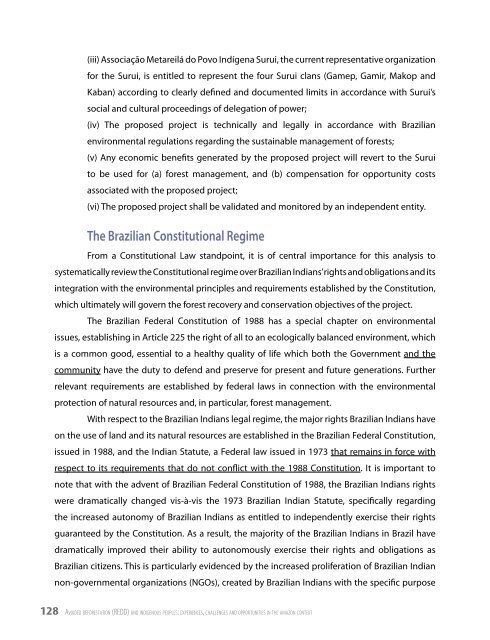Avoided Deforestation (REDD) and Indigenous ... - Amazon Fund
Avoided Deforestation (REDD) and Indigenous ... - Amazon Fund
Avoided Deforestation (REDD) and Indigenous ... - Amazon Fund
Create successful ePaper yourself
Turn your PDF publications into a flip-book with our unique Google optimized e-Paper software.
(iii) Associação Metareilá do Povo Indígena Surui, the current representative organization<br />
for the Surui, is entitled to represent the four Surui clans (Gamep, Gamir, Makop <strong>and</strong><br />
Kaban) according to clearly defined <strong>and</strong> documented limits in accordance with Surui’s<br />
social <strong>and</strong> cultural proceedings of delegation of power;<br />
(iv) The proposed project is technically <strong>and</strong> legally in accordance with Brazilian<br />
environmental regulations regarding the sustainable management of forests;<br />
(v) Any economic benefits generated by the proposed project will revert to the Surui<br />
to be used for (a) forest management, <strong>and</strong> (b) compensation for opportunity costs<br />
associated with the proposed project;<br />
(vi) The proposed project shall be validated <strong>and</strong> monitored by an independent entity.<br />
The Brazilian Constitutional Regime<br />
From a Constitutional Law st<strong>and</strong>point, it is of central importance for this analysis to<br />
systematically review the Constitutional regime over Brazilian Indians’ rights <strong>and</strong> obligations <strong>and</strong> its<br />
integration with the environmental principles <strong>and</strong> requirements established by the Constitution,<br />
which ultimately will govern the forest recovery <strong>and</strong> conservation objectives of the project.<br />
The Brazilian Federal Constitution of 1988 has a special chapter on environmental<br />
issues, establishing in Article 225 the right of all to an ecologically balanced environment, which<br />
is a common good, essential to a healthy quality of life which both the Government <strong>and</strong> the<br />
community have the duty to defend <strong>and</strong> preserve for present <strong>and</strong> future generations. Further<br />
relevant requirements are established by federal laws in connection with the environmental<br />
protection of natural resources <strong>and</strong>, in particular, forest management.<br />
With respect to the Brazilian Indians legal regime, the major rights Brazilian Indians have<br />
on the use of l<strong>and</strong> <strong>and</strong> its natural resources are established in the Brazilian Federal Constitution,<br />
issued in 1988, <strong>and</strong> the Indian Statute, a Federal law issued in 1973 that remains in force with<br />
respect to its requirements that do not conflict with the 1988 Constitution. It is important to<br />
note that with the advent of Brazilian Federal Constitution of 1988, the Brazilian Indians rights<br />
were dramatically changed vis-à-vis the 1973 Brazilian Indian Statute, specifically regarding<br />
the increased autonomy of Brazilian Indians as entitled to independently exercise their rights<br />
guaranteed by the Constitution. As a result, the majority of the Brazilian Indians in Brazil have<br />
dramatically improved their ability to autonomously exercise their rights <strong>and</strong> obligations as<br />
Brazilian citizens. This is particularly evidenced by the increased proliferation of Brazilian Indian<br />
non-governmental organizations (NGOs), created by Brazilian Indians with the specific purpose<br />
128 Av o i d e d d e f o re s t A t i o n (redd) A n d i n d i g e n o u s p e o p l e s: experiences, chAllenges A n d o p p o r t u n i t i e s in t h e A m A zo n c o n t e x t
















